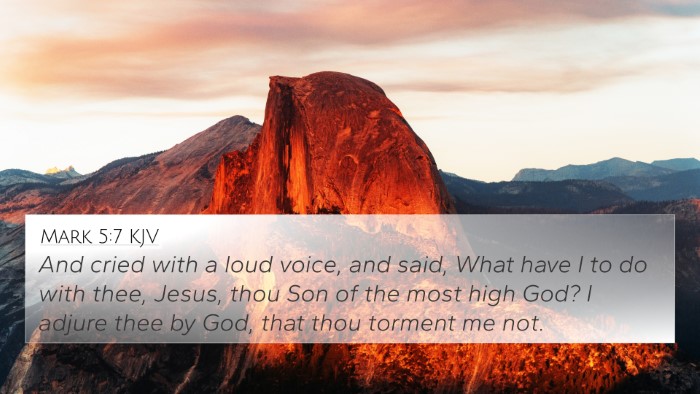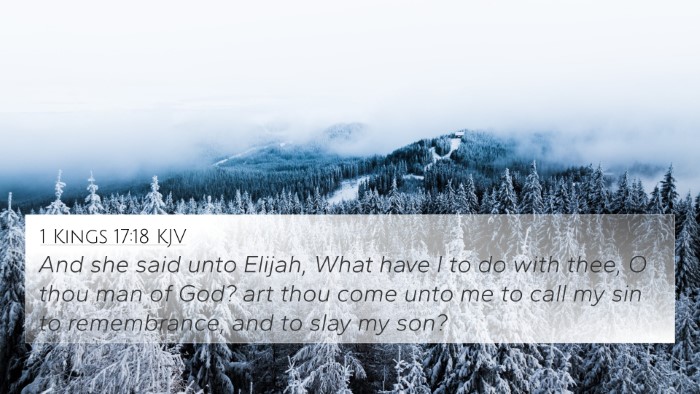Bible Verse Meaning: Mark 5:17
Mark 5:17 states: "And they began to pray him to depart out of their coasts." This verse captures the moment after Jesus performed a miraculous healing of a man possessed by demons, demonstrating His divine authority and compassion.
Summary of Interpretation
This verse highlights the reaction of the local community to the miraculous events brought about by Jesus. To understand this reaction, it is essential to explore the following insights drawn from notable public domain commentaries.
Insights from Commentaries
-
Matthew Henry:
Henry notes that the Gerasenes, upon witnessing the miraculous change in the possessed man—a transformation from a tormented state to being clothed and in his right mind—were not filled with joy but with fear. This fear stemmed from an unsettling recognition of Jesus' divine power, which led them to plead for Him to leave their region. Henry observes that this reaction signifies a troubling disregard for the miraculous when it disrupts their comfort or societal norms.
-
Albert Barnes:
Barnes elaborates on the implications of the townspeople's request for Jesus to leave. He suggests that their fear of what they did not understand led them to dismiss the one who had brought freedom to the tormented man. Instead of embracing the blessing of healing, they feared the potential consequences of allowing Jesus to continue His works. Barnes encourages readers to reflect on their openness to divine manifestations in their lives.
-
Adam Clarke:
Clarke points out the historical context of this event, emphasizing that the people likely felt a loss due to the death of the swine—demonstrating their material concerns over spiritual liberation. Clarke suggests that they prioritized their economic well-being over the spiritual revelation and transformation that Jesus offered, an attitude still prevalent in contemporary society.
Cross-References and Thematic Connections
Exploring connections between Bible verses can enrich our understanding of Mark 5:17. Here are several relevant cross-references:
- Matthew 8:34: "And behold, the whole city came out to meet Jesus; and when they saw him, they besought him that he would depart out of their coasts."
- Luke 8:37: "Then the whole multitude of the country of the Gadarenes round about besought him to depart from them; for they were taken with great fear: and he went up into the ship, and returned back again."
- John 3:19-20: "And this is the condemnation, that light is come into the world, and men loved darkness rather than light, because their deeds were evil. For every one that doeth evil hateth the light, neither cometh to the light, lest his deeds should be reproved."
- Matthew 21:10-11: "And when he was come into Jerusalem, all the city was moved, saying, Who is this? And the multitude said, This is Jesus the prophet of Nazareth of Galilee."
- Acts 7:51: "Ye stiffnecked and uncircumcised in heart and ears, ye do always resist the Holy Ghost: as your fathers did, so do ye."
- John 9:39: "And Jesus said, For judgment I am come into this world, that they which see not might see; and that they which see might be made blind."
- Romans 1:28: "And even as they did not like to retain God in their knowledge, God gave them over to a reprobate mind, to do those things which are not convenient."
Understanding Through Cross-References
Mark 5:17 serves as a powerful reminder of the conflicting reactions that Jesus invokes. The townspeople's fear and request for Jesus to depart can be seen as a theme throughout Scripture, where humanity often grapples with the radical changes brought by divine intervention. Engaging in cross-referencing Biblical texts helps us to see these patterns and themes that span the entirety of the Scriptures.
Tools for Bible Cross-Referencing
For the serious student of the Bible, employing a Bible concordance or a Bible cross-reference guide can provide deeper insights into these thematic connections. Here are some helpful tools and methods:
- Bible Concordance: An essential tool that lists words and passages, allowing users to find verses containing specific terms.
- Bible Chain References: A method of connecting verses that share similar themes or teachings.
- Cross-Reference Bible Study Methods: Practical ways to explore different passages and their interrelations.
- Comprehensive Bible Cross-Reference Materials: Various resources available in print and online that provide extensive cross-referencing tools.
Conclusion
Mark 5:17 is a striking verse that opens a window into human nature's reaction to divine presence and authority. The request for Jesus to leave serves as a cautionary tale about the dangers of prioritizing comfort over truth. Through thematic Bible verse connections, one can better understand the implications of this scripture in both a historical and contemporary context.
As we examine the links between different parts of the Scriptures, we are invited into an inter-Biblical dialogue that enhances our comprehension and appreciation of God’s word. Engaging in comparative Bible verse analysis allows believers to find profound truths and patterns across the pages of both the Old and New Testaments.












